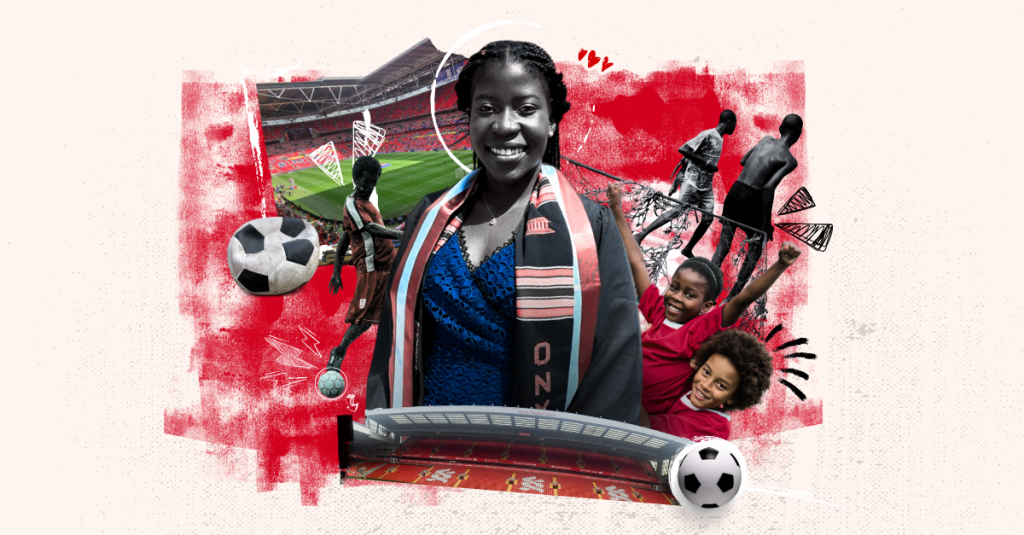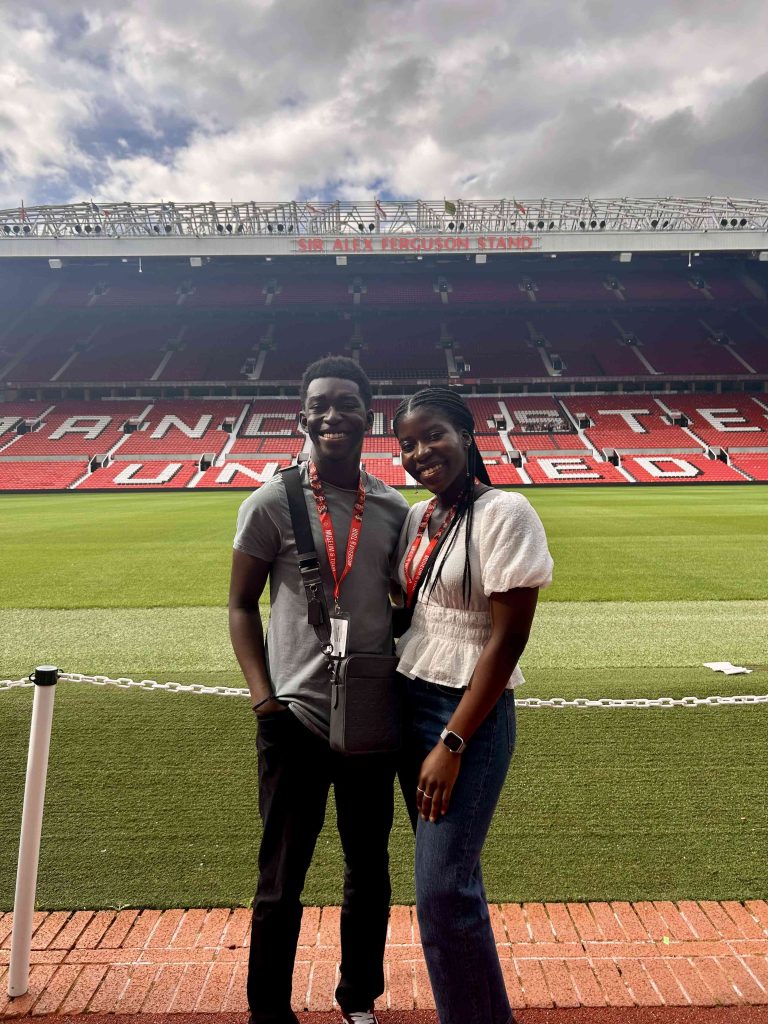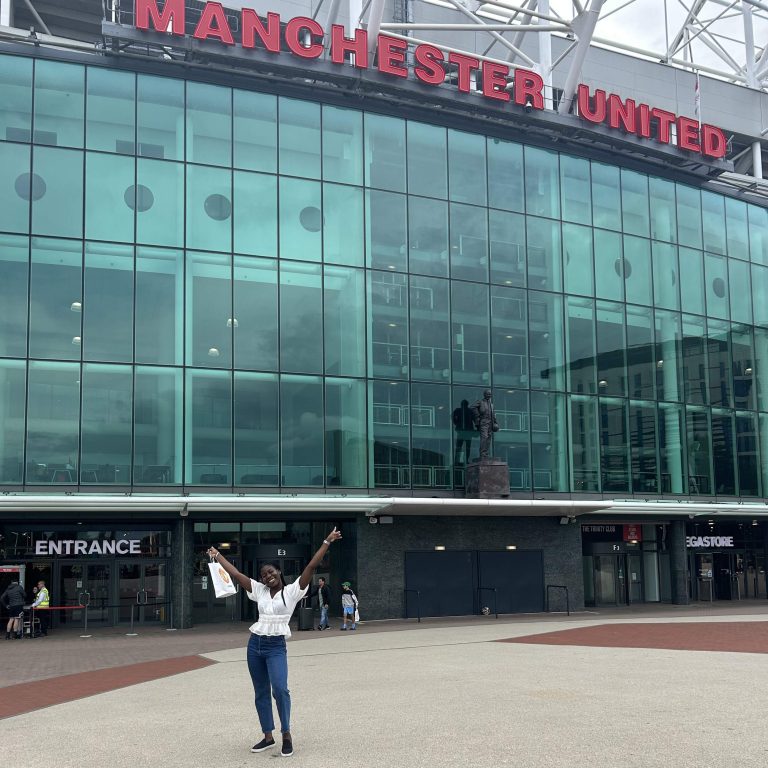
Photo illustration by Dami Mojid / THE REPUBLIC.
THE MINISTRY OF SPORTS
My Love Affair with the Beautiful Game of Football

Photo illustration by Dami Mojid / THE REPUBLIC.
THE MINISTRY OF SPORTS
My Love Affair with the Beautiful Game of Football
Do you remember where you were on the evening of 10 February 2013? I certainly do. Although it was a Sunday evening, the usual pre-Monday school rituals—polishing shoes, packing bags and ironing uniforms—had all been put on hold. The final game of the Africa Cup of Nations (AFCON) was underway in Johannesburg, and Nigeria was up against Burkina Faso. For weeks, the anticipation had been building. At church and at school, everywhere I turned, Nigeria’s Super Eagles were the topic of conversation. Earlier that month, they had stunned tournament favourites Côte d’Ivoire with a dramatic comeback victory. Then came a dominant 4–1 thrashing of Mali to cement their place in the final. We were so close to glory, but just as close to defeat.
When the whistle blew to start the match, time seemed to move both quickly and slowly. It froze when Nigeria’s Sunday Mba scored the first and only goal. It jumped forward with every close call, every missed opportunity to extend our lead and every save from our goalkeeper, Vincent Enyeama. Time slowed to a crawl again in those agonizing final minutes of extra time, when we all waited with bated breath to see if the Super Eagles could take it all the way. I remember Enyeama at the centre of it all, stalling in those final seconds. Then suddenly, he was hugging the referee, and the final whistle was blown. Just like that, Nigeria’s nearly 20-year drought was over. We were AFCON champions! The cheers of joy rose up around me like a chorus, spilling out from neighbours’ windows and matching the jubilant roar of the crowd in the stadium.
Stephen Keshi, one of the few coaches to win AFCON as both player and manager, stated after the victory that his dream was ‘to make Nigerians happy’. And he had done it, at least, he had done it for me. I felt an immense sense of pride, though I hadn’t played a single minute of the game and I was in Surulere, not South Africa. But somehow, the Super Eagles had won, and so had I. That is the magic of the beautiful game.
FOOTBALL AND FAMILY: A LOVE PASSED DOWN
I can’t quite pinpoint when exactly I became a football fan; it has always been woven into the fabric of my life. It always felt natural to pick up a copy of Supa Strikas at Mr Bigg’s on my way back from primary school, and to tune in to Premier League games on Saturday and Sunday evenings. Looking back, it all began with my uncle, who indoctrinated my brother as a toddler, buying him his first Manchester United jersey and watching and analysing games with him. I suppose that I too became a fan by osmosis and developed an interest while spending time with my brother. For me, then, football is fundamentally about family; it is an inheritance that is passed down across generations.
Over the years, I have seen this interest become a passion. As I’ve grown, football has grown with me. The game has followed me from my pre-teen years in Lagos, when my main curiosity during matches was which male player had the nicest hair, to adulthood, where I have come to truly appreciate football and what it represents. My curiosity, which has become almost academic, drives me to explore why Manchester United’s midfield is consistently the weakest part of the team, why the Glazer family’s ownership of the club poses significant challenges to their development, and why the proposed European Super League was so controversial.
If football was my field of study, then my brother was my teacher. It was by listening to him and our childhood friends when they gathered on Saturday and Sunday afternoons that I gained a deeper understanding of the game. Over their arguments, ranging from the ubiquitous ‘Ronaldo or Messi?’ to ‘Who will win the Premier League title?’, I was educated on the fundamentals of football: the offside rule, the away goal rule, the set-piece play. I also learned how to speak in the unique Nigerian dialect of football: sagalo for a scissor kick, kolo for a nutmeg and lago for missing the ball when attempting to pass or shoot. I also got hands-on experience of my own, playing with the other children in my neighbourhood on Saturday mornings and Sunday afternoons. Though I found joy being on the pitch, I was one of the few girls who played on the team. This fact became uncomfortable as childhood gave way to adolescence and eventually brought my playing career to an end. There are times I wonder what might have been had I persisted on the field. In either case, I’ve found my home as a spectator.
Brazilian football sensation, Ronaldinho Gaúcho, once said, ‘I learned all about life with a ball at my feet.’ Though I hung up my football boots long ago, watching the game has taught me invaluable life lessons: what it means to work with a team, to let go of disappointments and to believe in the possibility of victory against all odds.
shop the republic


ON KINSHIP AND COMMUNITY
The communal cheers across the neighbourhood when Mba scored that goal in the 2013 AFCON final demonstrate how football invites us to be part of something bigger than ourselves. The game gives a sense of belonging that transcends where we come from, what we look like and what challenges await us when the match is done. For 90 minutes, we set aside the realities and stressors of daily living to experience moments of collective celebration (or dismay, depending on the outcome of the match).
This sense of community also extends beyond fandom. Though we are several thousand kilometres away from the players, football bridges the gap between us. As Nigerians, we saw ourselves in Kano Nwankwo and Jay-Jay Okocha and today, have come to see ourselves in Victor Osimhen and Ahmed Musa. We berate them in moments of defeat but share in their moments of triumph. I wonder if this is why Rashidi Yekini gripped the football net in an iconic outburst of jubilation after he scored Nigeria’s first World Cup goal in 1994. He may have known, on some level, that he had not only brought a sense of pride to a nation but had also united its people in joy.
When I left Nigeria in 2015, first for Wales and then the United States, I found myself longing for this sense of collective happiness, and for the weekends spent watching football games with my family and friends. Like many others across the globe, my feelings of isolation and homesickness were only exacerbated during the height of the COVID-19 pandemic. Coupled with the widespread racial injustices that were brought into focus during that time, it felt like the world had been plunged into chaos and sadness. Football then became a necessary balm for loneliness and pain. I woke up early on Saturday mornings to watch Premier League games, followed the self-proclaimed pundits on Nigerian ‘football Twitter’, whose arguments mirrored those between my brother and our neighbours in Surulere and started listening to football podcasts. Football brought, and continues to bring, comfort in the most trying of times, and a much-needed sense of home.
This is the reason why fans remain dedicated to our teams, even when they lose repeatedly. It is the reason why my brother will vow today to never watch Manchester United play again, but will faithfully tune in to the next match, donning the Red Devils’ jersey. As someone who has spent several years in a country and culture marked by individualism and loneliness, football provides me with an important reminder that I belong to something larger than myself.
shop the republic
RUINING A BEAUTIFUL THING
To understand the beautiful game, we must reckon with its ugly side as well: the gender inequality it perpetuates, the domestic abuse it exacerbates and the systemic barriers that limit women’s involvement. I may be a football fan, but I am a young Nigerian woman first. My passion for the game is often met with scepticism, rooted in stereotypes. I face constant assumptions that my interest is inauthentic and part of an alleged strategy to fit in with or be validated by men. These perceptions frustrate me deeply and represent a much larger societal problem of trivializing female fandom.
Unfortunately, I must count myself lucky that I am not one of the many female football fans who are subject to egregious acts of verbal and physical abuse, simply for daring to exist in what is still a male-dominated space. The culture surrounding football, though it can foster expressions of joy and affection, may also be a forum for violent manifestations of anger which are too often directed at women. This is why there is a significant correlation between the incidence of domestic abuse and football games. For example, domestic abuse reports increase significantly whenever the national men’s team of England plays, even when they win.
The effects of patriarchal structures are felt by female football fans and professionals alike. Women are underrepresented in all aspects of football, from club leadership to coaching and refereeing. There is also a significant and persistent football wage gap between men and women. Despite the growth that women’s football has seen in recent years, there is still a disparity in media coverage and viewership between the two. Moreover, professional female footballers are not exempt from the abuse and assault that their fans face. This is a reality we were reminded of when Luis Rubiales, the former president of the Spanish football federation, forcibly kissed Spanish footballer Jenni Hermoso following Spain’s 2023 Women’s World Cup win, overshadowing what should have been an occasion of pride and celebration. Though there have been strides towards achieving gender equity, football still feels at times like a game for men.
As an avid fan and a Nigerian woman, I must reckon with the fact that I love a sport that does not always love me back. This is the reality of male-dominated sports, where the game has become intertwined with traditional notions of manhood and masculine identity. To some, the participation of women presents a threat to this identity, giving rise to vehement opposition. It is not surprising that, when female participation in football started to gain traction in England in the early 1900s, the English Football Association (FA) banned their participation in the sport, deeming the game ‘quite unsuitable for females.’ In the same way that women have had to fight for their right to vote and to work, they have also had to combat exclusion on and off the pitch. I am grateful for the generations of women, from Mary Hutson, who led the first women’s football club, to Megan Rapinoe, who advocated with the United States National Women’s Team for equal pay, who continue to challenge the status quo and make space for women in the game.
Though I am just a spectator, I too have a role to play. I feel compelled to be unapologetic in my fandom, pushing people to examine their own prejudice and to realize that the sport belongs to all. I am called to be intentional in supporting women’s football—starting close to home with Nigeria’s Super Falcons, who have dominated the Women’s African Cup of Nations (WAFCON) and have just completed their quest, dubbed ‘Mission X’, to win a record tenth title. My hope is that the continued growth in advocacy for female fans and players will further bring women out from the margins and into the mainstream of the beautiful game.
shop the republic
-
‘The Empire Hacks Back’ by Olalekan Jeyifous by Olalekan Jeyifous
₦70,000.00 – ₦75,000.00Price range: ₦70,000.00 through ₦75,000.00 This product has multiple variants. The options may be chosen on the product page -
‘Make the World Burn Again’ by Edel Rodriguez by Edel Rodriguez
₦70,000.00 – ₦75,000.00Price range: ₦70,000.00 through ₦75,000.00 This product has multiple variants. The options may be chosen on the product page -
‘Nigerian Theatre’ Print by Shalom Ojo
₦150,000.00 -
‘Natural Synthesis’ Print by Diana Ejaita
₦70,000.00 – ₦75,000.00Price range: ₦70,000.00 through ₦75,000.00 This product has multiple variants. The options may be chosen on the product page
shop the republic
AT THE FINAL WHISTLE
Despite football’s complicated history with women, I can’t help but be grateful for what it has given me: a piece of home that is only one game away. As Dani Rojas, a character in the heartwarming series Ted Lasso, says: ‘Football is life.’ And it truly is. It is a warm reminder of evenings spent in my childhood home. It is the sense of community for those of us who wake up at 8 a.m. on Sunday to watch a game. It is about my love for my brother⎈
BUY THE MAGAZINE AND/OR THE COVER
-
‘Make the World Burn Again’ by Edel Rodriguez by Edel Rodriguez
₦70,000.00 – ₦75,000.00Price range: ₦70,000.00 through ₦75,000.00 This product has multiple variants. The options may be chosen on the product page -
The Republic V9, N2 Who Dey Fear Donald Trump? / Africa In The Era Of Multipolarity
₦40,000.00
















